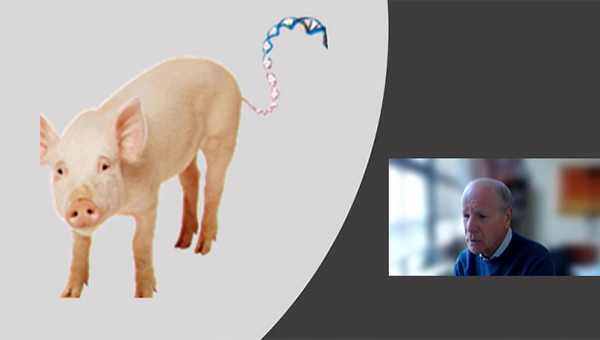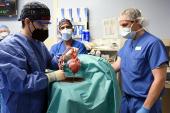Xenotransplant of Pig Heart ‘Just Baby Steps,’ Lead Surgeon Says
Over two presentations at the STS and THT meetings, Bartley Griffith shared new details about the historic surgery.

Photo Credit: Adapted from Griffith BP. Extra special lecture: Xenotransplant - a conversation with Dr. Bartley Griffith. Presented at: THT 2022.
The lead surgeon on last month’s first in-human xenotransplant of a genetically modified porcine heart is now offering some additional details about how the surgery came to be and where he expects the procedure to go from here.
One month ago, a team at University of Maryland Medical Center (UMMC) in Baltimore, led by Bartley P. Griffith, MD, made history by conducting the transplant in 57-year-old David Bennett. In the weeks that followed, many have expressed amazement, although the triumph has lately been tempered by more-realistic expectations.
Speaking virtually at the recent Society of Thoracic Surgeons (STS) and Technology and Heart Failure Therapeutics (THT) 2022 meetings, Griffith outlined the history of xenotransplantation, gave an update on the status of Bennett, and offered predictions for the future.
“Of course, there's a lot of excitement about this one case, but this is just baby steps,” he said during his STS talk. “It's a big step, but it's a small overall success in terms of bringing it to the world.”
While mechanical circulatory support (MCS) has been in development for more than 30 years, Griffith said he believes “biologic replacement” is ultimately a superior option. “There's no reason to believe that these xeno hearts won't hang in there for nice long time, and the immune suppressant protocols are not as onerous as I thought they might be,” he said. MCS, however, “is where it's going to be for quite a while.”
Xenotransplantation will be limited, if only because the availability of genetically modified pigs is not yet at a level to meet demand, he said, adding that he’s optimistic a multicenter trial will be running within the next year and a half. “It's going to be a thoughtful process like anything else. All good things in our specialty happen over time and with some big changes but also very small ones.”
‘Will I Oink?’
As for how Bennet is doing, Griffith reported “absolutely normal” LV strain with an EF of about 65-70% on post-op day 24. “It looks like his recovery is not going to be held back by his heart, but by the usual things you might expect somebody who hadn't been out of bed for 50 or 60 days is going to have to overcome,” he said.
Looking back on how the field got to this point, Griffith reported that his team had been in talks with the US Food and Drug Administration (FDA) about a multicenter trial on xenotransplant before ever meeting Bennett. “There was some discussion about what would happen while we're kind of getting the boxes checked for a future IDE, which may be as long as 2 years from now,” he said.
Upon referral to UMMC’s cardiac ICU, Bennett already had traveled a bumpy road. “He had kind of a rough start in life. He was a bit of a rascal,” Griffith commented at THT, citing his history of assault that drew headlines after the transplant. “That didn't enter into any of our decisions,” he confirmed.
Additionally, following a 2012 mitral valve repair and noncompliance with heart failure protocols, “his family doctor said that he was probably the worst patient he's ever had,” Griffith reported, adding that Bennett had been turned down for allotransplant by at least four other institutions.
When it was clear Bennett “had no off-ramp at all and he looked to have single-organ disease, we felt that maybe [xenotransplant] would be worth trying,” Griffith said. All of the complex decision-making for this one procedure, both with the FDA and also internally within the institution, “consumed more than a month of my non-RVU time.”
In presenting the idea to Bennett, he recalled going through the entire explanation of xenotransplant. But, Griffith acknowledged, “I didn't tell him it was a pig until the very end of the conversation, not wanting to scare him off. And at the end of it he said: ‘I'd rather have a human heart, but if I can't have it, yeah, I'll take the pig heart.’”
Bennett asked Griffith only one “rather silly” question, the surgeon said: Will I oink? “He wasn't worried about PERVs [porcine endogenous retroviruses] or other issues, the fact that it had never been done before. He just wanted to live,” said Griffith.
Looking back on the past “amazing” 4 weeks, Griffith described himself as “still a little bit in shock” over everything. “To see a patient sitting up, watching a football game, wishing his surgeon a happy birthday with a well-functioning pig heart is just unbelievable,” he said.
Yael L. Maxwell is Senior Medical Journalist for TCTMD and Section Editor of TCTMD's Fellows Forum. She served as the inaugural…
Read Full BioSources
Griffith BP. Genetically modified xenotransplantation: the future is now. Presented at: STS 2022. January 30, 2022.
Griffith BP. Extra special lecture: xenotransplant - a conversation with Dr. Bartley Griffith. Presented at: THT 2022. February 2, 2022.





Comments